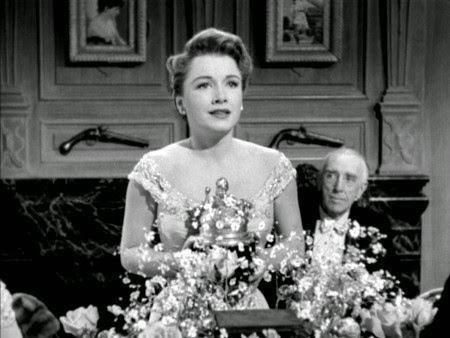In reading from Richard Dyer's Stars, I was fascinated by how much of the theory so easily applied to the world (and the women) of All About Eve. In Mankiewicz's fabulous film, we are treated to not one but two great stars, one in her natural habitat and one in the act of being created.
The section regarding stars being the product of production or consumption particularly resonated for me in relation to All About Eve. In All About Eve we see both of these functions. First we meet Margo as a star, and we see that she has been a commodity long enough that her status now relies on a symbiosis between production and consumption. She is hired by productions because she puts butts in seats (consumption); Lloyd Richards confirms that Margo has been hired for his plays in the past for this very reason in his speech to Karen: "for once to write something and have it realized completely. For once not to compromise." But Margo also needs to continue to do plays to maintain her status (production), as indicated when she decides to de-emphasize her career and rejoices that she finally won't "HAVE to play parts [she's] too old for" anymore.
Meanwhile Eve Harrington's navigation to stardom requires her to secure both production and consumption. To secure consumption, she employs publicity first by securing critics at her understudy performance, then through Addison DeWitt's column, and finally by the time she wins the Sarah Siddons awards, we are told "she's been profiled, covered, revealed, reported..." Consumption alone is not enough, though--not at first. She needs production; she needs a show. In this case she needs Cora, and it isn't until she gets that part that she is truly set up to become a star.
For the women of All About Eve, it takes more than just production or consumption. Mankiewicz's script holds up as glorious truth the idea which Dyer calls "not intellectually very respectable" that stars can only hang in the constellations because they are exceptional. What Dyer talks of as talent, Addison DeWitt describes as a "moment of revelation." We are told in no uncertain terms that both Margo Channing and Eve Harrington have this "music and fire" which is essential to making the production and the consumption stick.
All About Eve also delves into each of these women's persona/ star image. We see that the key to Eve's success both on and off stage is pinned on her sincerity (similar, I imagine, to that sincerity that made Kate Smith's bond sales so lucrative). Margo's image is more complicated, fierier. From Karen's line, "It's about time Margo realized that what's attractive on stage need not necessarily be attractive off," we know that she has quite a history of on stage persona, and we know that she has trouble leaving it behind. In fact, Margo's inability to decipher between her persona and her person recurs throughout the film--she asks Lloyd to "let her in on [herself]" and wonders to Karen what will happen between herself and Bill in ten years when Margo Channing "cease[s] to exist."
So it seems that Richard Dyer and Joseph Mankiewicz agree on the logistics of being a star, although Mankiewicz's slant is much more deliciously diabolical.








No comments:
Post a Comment
Note: Only a member of this blog may post a comment.